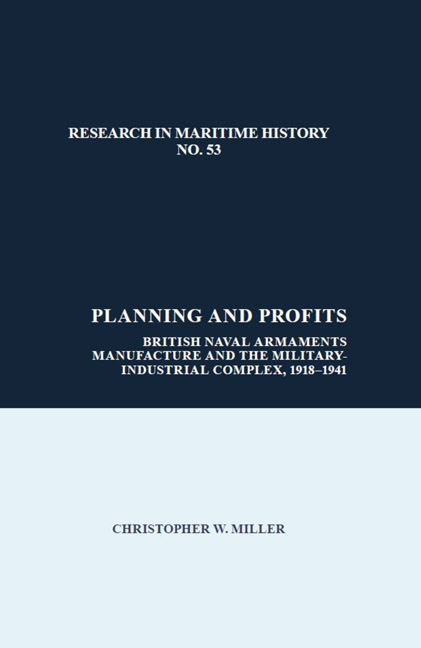 Planning and Profits
Planning and Profits Book contents
- Frontmatter
- Contents
- Acknowledgements
- About the Author
- List of Tables and Figures
- List of Illustrations
- List of Abbreviations
- A Note on Definitions
- Part One Introduction
- Part Two Industry and the Navy before Manchuria, and the Establishment of the Warshipbuilders’ Committee, 1919–1931
- 3 From Boom to Bust: The Private Naval Arms Industry and the Admiralty, 1919–1926
- 4 From Competition to Collaboration: The Warshipbuilders’ Committee and the National Shipbuilders’ Security Scheme, 1926–1931
- Part Three The Formation of a National Government, the Far East, and the PSOC Approach to Industry, 1931–1934
- Part Four The Ultimate Potential Enemy and Rearmament Planning, 1934–1936
- Part Five The Inskip Era and War, 1936–1941
- Conclusion and Retrospective
- Appendices
- Bibliography
- Index
4 - From Competition to Collaboration: The Warshipbuilders’ Committee and the National Shipbuilders’ Security Scheme, 1926–1931
from Part Two - Industry and the Navy before Manchuria, and the Establishment of the Warshipbuilders’ Committee, 1919–1931
- Frontmatter
- Contents
- Acknowledgements
- About the Author
- List of Tables and Figures
- List of Illustrations
- List of Abbreviations
- A Note on Definitions
- Part One Introduction
- Part Two Industry and the Navy before Manchuria, and the Establishment of the Warshipbuilders’ Committee, 1919–1931
- 3 From Boom to Bust: The Private Naval Arms Industry and the Admiralty, 1919–1926
- 4 From Competition to Collaboration: The Warshipbuilders’ Committee and the National Shipbuilders’ Security Scheme, 1926–1931
- Part Three The Formation of a National Government, the Far East, and the PSOC Approach to Industry, 1931–1934
- Part Four The Ultimate Potential Enemy and Rearmament Planning, 1934–1936
- Part Five The Inskip Era and War, 1936–1941
- Conclusion and Retrospective
- Appendices
- Bibliography
- Index
Summary
Naval arms manufacturers were in a depressing position at the beginning of 1926, and this suffering prompted the radical action that followed. It was against the backdrop of the cruiser crisis and the naval treaties in the mid-1920s that the WSBC was formed. The committee grew out of other unsuccessful attempts to assist private industry in 1925 and 1926 which drove shipbuilding firms towards collaboration rather than competition. Unable to count on the Admiralty's ability to win increases from the Treasury or Cabinet in the medium term, the individual yards soon realised that the process of competitive tendering was unsustainable and could even drive most of them out of business.
By 1926, it was time for action. The situation was becoming acute: the Coventry Ordnance Works had closed altogether, while Beardmore, Scott and Yarrow had completely run out of profitable work, naval or otherwise, and Palmer and others had fared little better. Sir Alexander Kennedy, the Chairman of Fairfield, summed up the mood of firms in a similar position to his own when he noted despondently that “today private firms [find] themselves burdened with resources and equipment capable of meeting naval requirements far beyond any programme that might for some years to come – if not for ever – likely to be laid down.” His words could have come as easily from the First Lord, who after all was providing the hard evidence which supported Beatty's and D'Eyncourt's worst fears.
Admiralty Responses II: Bending Rules
The Admiralty for its part had long been a champion of state funding to provide a minimum level of orders to ensure firms’ survival, even if this would still be a long way from providing an opportunity for the private industry to maintain the world primacy it had enjoyed before Washington. On top of the heated discussions with the Treasury, the Admiralty had also devised several schemes to preserve capacity of key items where few alternative sources of supply existed, but these plans were often poorly conceived and for the most part did not work well.
It has been asserted elsewhere that the Admiralty's concerns about naval gun capacity forced them to give Vickers a “virtual monopoly of contracts” for the rest of the 1920s.
- Type
- Chapter
- Information
- Planning and ProfitsBritish Naval Armaments Manufacture and the Military-Industrial Complex, 1918–1941, pp. 47 - 76Publisher: Liverpool University PressPrint publication year: 2018
